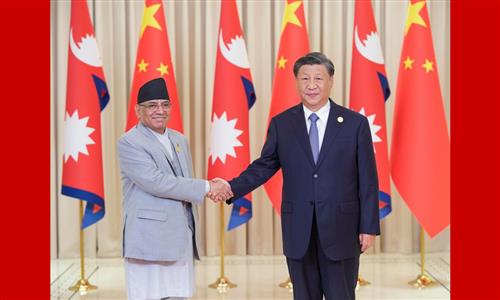IN-DEPTH / DIPLOMATIC CHANNEL
Exclusive: Nepal to maintain non-aligned policy in friendly relations with neighbors, hopes China’s strengths will help bolster economy: Nepalese PM
Nepal to maintain non-aligned policy in friendly relations with neighbors, hopes China’s strengths will help bolster economy: Nepalese PM
Editor's Note:
At the invitation of Chinese Premier Li Qiang, Nepalese Prime Minister Pushpa Kamal Dahal Prachanda commenced his five-day state visit to China from September 23 to 30, his first visit to China since the start of his third term as the Prime Minister of Nepal. The 69-year-old is a legendary figure in Nepal. Born in a poor Brahmin farming family in Pokhara in 1954, he witnessed abject poverty in his youth. Determined to change his country's corruption and a ruling exploitative class, Prachanda embarked on a revolutionary path to transform Nepal's destiny. In 2008, he became the first prime minister of Nepal after the abolition of the monarchy. In 2016, he assumed the office of prime minister for a second term, and in November 2022, this veteran of Nepalese politics made a comeback for a third term. As a staunch socialist and a long-time member of the Communist Party, Prachanda has deep ties to China. After assuming office as the first term as prime minister of Nepal, the first country he visited was China. In 2008, he also came to Beijing to attend the opening ceremony of the Beijing 2008 Olympic Games.
Global Times reporters Hu Yuwei and Bai Yunyi (GT) recently interviewed Prachanda while on his official visit to China. He told the reporters that part of his dream when he first embarked on the revolutionary path has been realized. During this third term, he hopes to promote long-term unity, stability, and economic prosperity in Nepal, and for this, he will seek to strengthen cooperation with China within the framework of the Belt and Road Initiative (BRI). He believes that China's experience in development has provided valuable insights for his government in improving the socio-economic conditions of vulnerable groups within Nepal.
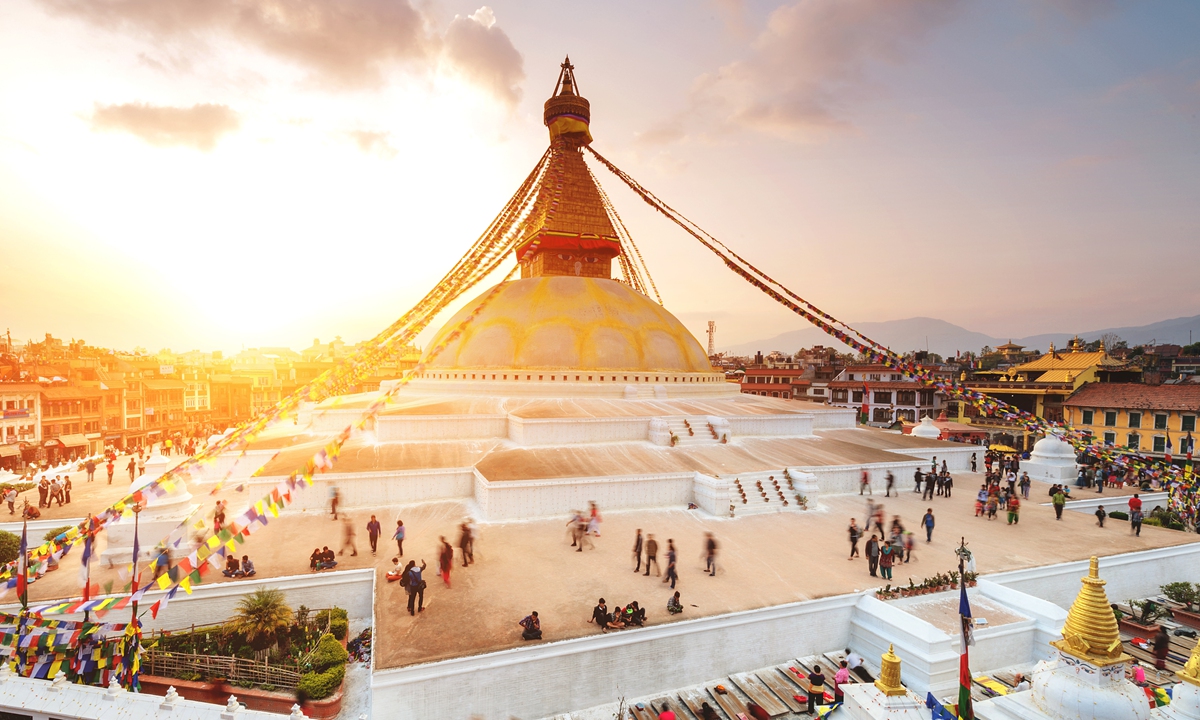
GT: This is your third term as the Prime Minister of Nepal. Your premiership has great expectations attached to it. Can you please elaborate on the key priorities your administration has to lead Nepal into a new era of prosperity?
Prachanda: I am committed to the task of guiding the country toward the path of prosperity. Our foremost concerns are peace and prosperity. The current government has been focused on accelerating the truth and reconciliation process. Our objective is to achieve both domestic and international peace, and we are committed to expediting the peace-building initiatives through which we can successfully lead the country out of the transitional phase. Ensuring comprehensive peace, effective governance, upholding the rule of law, fostering national unity, and achieving political consensus are necessary for long-term stability of the nation and fostering a robust economic environment.
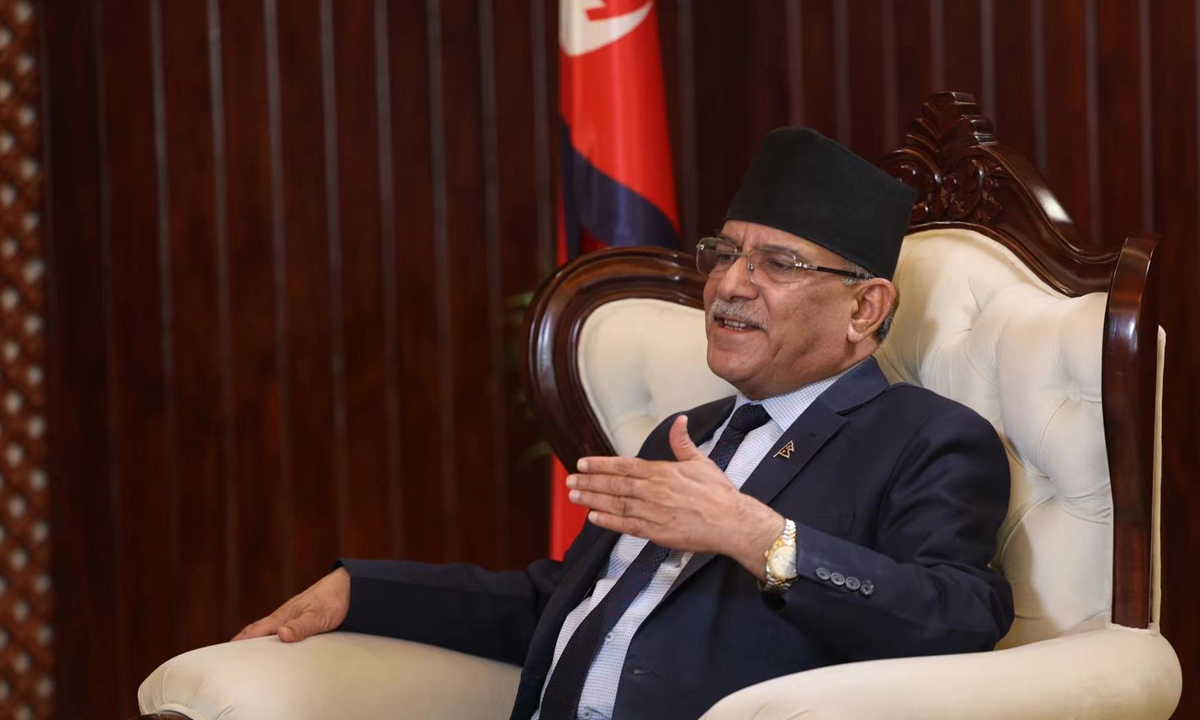
GT: Will relations with China become one of your administration's diplomatic priorities? What are your expectations for China-Nepal relations during your tenure?
Prachanda: China-Nepal relations consistently serve as a remarkable example of good neighbourliness. China occupies an important place in Nepal's diplomatic priorities. Nepal-China relations are based on millennia-old cultural, economic, and people-to-people ties, and are guided by the principles of peaceful coexistence, harmony, goodwill, and mutual trust. Nepal has unwavering support for the one-China principle, which is committed to not allowing any kind of anti-China activities on our soil. We also highly value China's unconditional support for Nepal's socio-economic development and territorial integrity, which have been the hallmarks of our cordial and neighbourly relations.
I am confident and optimistic that China-Nepal relations will be further consolidated, which will reach a new height during my tenure. We have accorded priority to develop cross-border connectivity networks, including roads, railways, transmission lines, airways, and telecommunications. Our top priorities include establishing cross-border economic zones, expanding trade and investment-related infrastructures at border points, and early implementation of previously agreed bilateral agreements and understandings.
We are fully committed to accelerating the construction of cross-border railways and electricity transmission lines as early as possible. Nepal attaches greater importance to all cross-border connectivity projects; we anticipate a similar commitment from the Chinese side as well.
Enhanced air connectivity between China and Nepal is another important sector that would strengthen China-Nepal relations and cooperation. If we operate flights from Lumbini and Pokhara airports to different Chinese cities and the vice versa, it would significantly help in revitalizing Nepal's tourism sector and creating job opportunities in Nepal.
Enhanced air connectivity between China and Nepal is another important sector that would strengthen China-Nepal relations and cooperation. If we operate flights from Lumbini and Pokhara airports to different Chinese cities and the vice versa, it would significantly help in revitalizing Nepal's tourism sector and creating job opportunities in Nepal.
Nepal has a huge trade imbalance with China. Nepal possesses immense potential in organic staple foods, fruits, vegetables, and dairy products, while China possesses significant technological, production, and marketing prowess. We hope that China will assist Nepal in supplying advanced agricultural and food processing technology with fresh investment to Nepal, which would enhance our agricultural exports and reduce the trade deficit. We are optimistic that China will open its huge market to Nepali agro-vet products, medicinal and aromatic plant-based goods, cosmetics, and handicrafts. We also seek Chinese investments in the development of hydrogen energy which would benefit both of our countries in producing clean energy and reduce carbon emissions.
We are keen to explore greater business opportunities for Nepali art forms, such as thangka paintings, carpets, and other woollen products in the Chinese market.
Chinese support for the development of technical and vocational education is immensely important. China and Nepal have enjoyed friendly people-to-people relations and cultural cooperation for centuries. Mutual trust and cooperation have been the fundamental pillars of China-Nepal relations, which will continue in the future as well.
China and Nepal must make common efforts to address the issues related to the impact of climate change in the Himalayan region and enhance all-round trans-border cooperation to address the issues that have impacted both countries. Nepali government is eager to collaborate with China to promote regional peace, prosperity, and development.
GT: When you first took office as the prime minister of Nepal, the first country you visited was China. Now on your third term in office, what agenda will your current visit to China entail?
Prachanda: I have consistently prioritized fostering friendly relations and cooperation with China. Our two countries are actively collaborating on various issues and extending cooperation through diplomatic channels.
Our key priorities with China include early and time-bound implementation of previously agreed upon agendas and understandings. At the same time, we want to further boost economic cooperation. Our particular emphasis is to attract more Chinese direct investments in Nepal, promote trans-Himalayan connectivity networks, increase Nepali exports to China, and address Nepal's trade deficit.
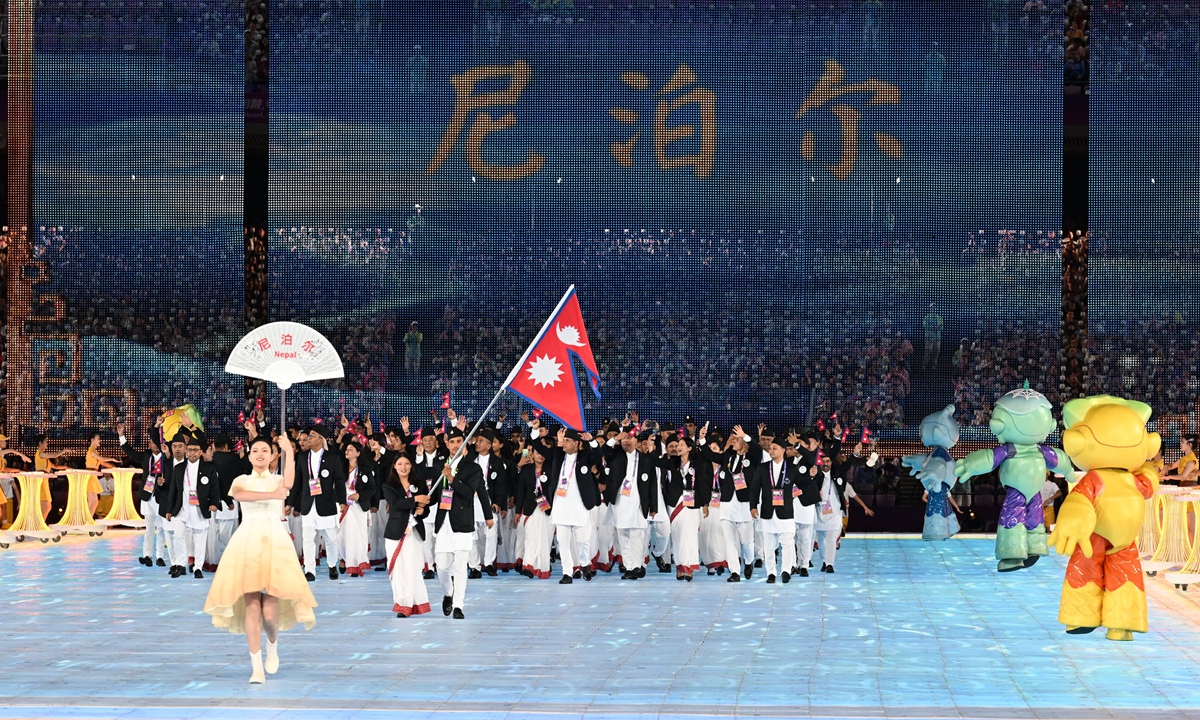
GT: The current economic situation in Nepal is challenging with inflation at a near six-year high. Foreign exchange reserves continue to drain away, and basic commodities are becoming increasingly dependent on imports. What are your next steps for economic revitalization? Will it involve the strengthening of economic cooperation with China through such initiatives as BRI projects?
Prachanda: Nepal urgently requires to create more jobs in order to address the unemployment problem, enhance productivity, expand the output of exportable goods and services, explore new markets for export, control inflation, and maintain trade balance. These objectives stand as my foremost priorities. For this, we are collaborating with planners, economists, industrialists, business leaders, and various stakeholders to identify suitable solutions to these challenges.
Emphasis has been placed on prioritizing policies and initiatives that foster a favorable investment climate, thereby drawing increased foreign investment to sectors that lack adequate domestic capital and technology. This approach is aimed at generating an environment conducive to growth and development.
China has ascended to become the world's second-largest economy, showcasing remarkable achievements in the socio-economic transformation of its society. Notably, China serves as a significant pillar of economic support for Nepal. Since the establishment of diplomatic relations between Nepal and China in 1955, China has played an important role in assisting Nepal's infrastructure and development endeavors. Many of these projects hold immense importance for our nation's progress.
As China continues to advance, its support and investment in Nepal are continuously growing. Nepal views China's development trajectory as an opportunity, with the BRI serving as a suitable platform for enhancing trans-Himalayan multidimensional connectivity. This connectivity has great potential for realizing Nepal's economic goals while acting as a vibrant bridge between the two largest economies in Asia and also between China and South Asia. A Memorandum of Understanding (MOU) has been signed between China and Nepal, solidifying mutual commitment to the BRI. We are fully prepared to take the maximum benefits from this cooperative framework.
The present government attaches paramount importance to investments from China. We are equally prepared to engage in discussions and resolve any obstacles that Chinese investors might encounter.
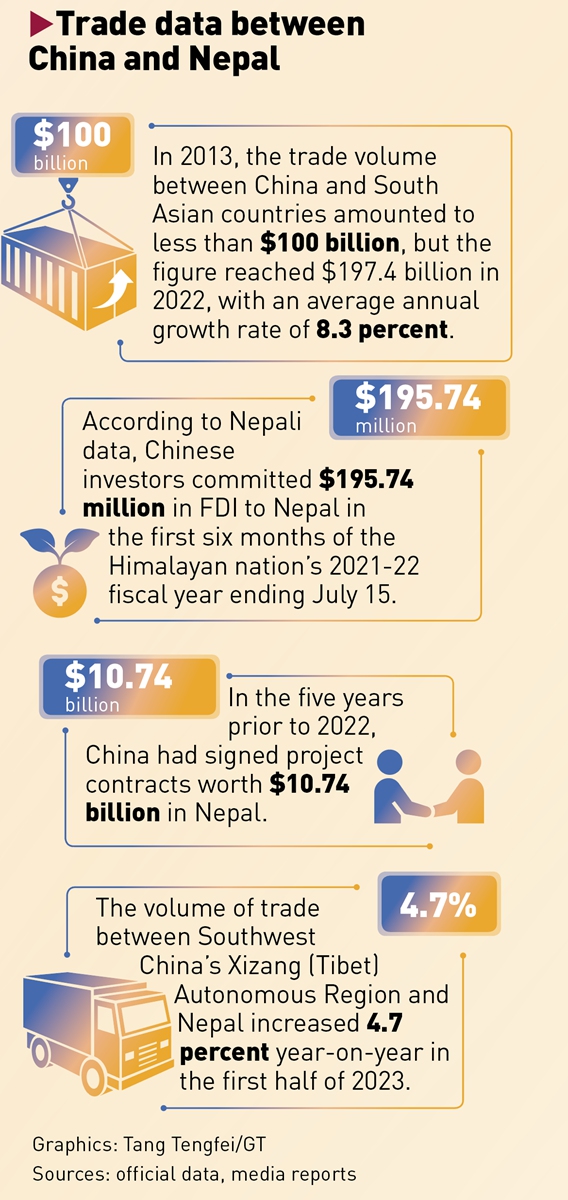
GT: We are closely following the developments of the China-Nepal railway project. Do you have the will to push this project forward during your tenure?
Prachanda: The Nepali people have high expectations for the China-Nepal railway, and they are eager for the railway project to commence as soon as possible. Once completed, the railway will provide Nepal with an alternative means of bulk transportation and will hold immense significance for Nepal's trade diversification efforts and transit options.
The primary concern associated with this project is how quickly we can bring it to fruition. You must be aware that the construction of this project requires a substantial amount of resources that Nepal alone cannot afford. In such a situation, we have no choice but to rely on external funding. However, we also share concerns that the size of the loan for this project and terms and conditions should be manageable for the Nepali economy. Feasibility studies are currently underway, and we hope that the report will be available soon. Following that, we will need to explore appropriate funding modalities for the project. Under my leadership, this government is prioritizing the early completion of the study, and I hope to initiate the construction of this visionary project during my tenure.
The China-Nepal railway is a monumental project, and the people of Nepal are eager to see it realized. It is not critical for this project to commence during my term; what truly matters is that we have a collective dream of connecting Nepal and China through a railway system.
GT: Many people are concerned about how Nepal will handle its relations with China and India in the future. How will you guide Nepal's relations with these two neighbors?
Prachanda: Nepal's relations with both China and India are guided by principles of good neighborliness, peaceful coexistence, and a non-aligned foreign policy. Nepal deals with China and India independently. Our relationship with one neighbor will not be influenced by our relationship with the other, nor will we seek to play one against the other. Both neighbors are close friends and important development partners. We will continue to develop our relationships with both the neighbors on a bilateral basis. If any differences arise with either of them, such issues will be resolved through friendly bilateral negotiations.
Our relations with both our two immediate neighbors are consistent and clear. We want friendly relations with them and at the same time we want to see friendly and cooperative relations between our two neighbors as well. Their amicable and cooperative relations will also help Nepal. Personally, I am committed to promoting and am willing to assist in fostering close and harmonious neighborly relations between both our two important neighbors.
Nepal respects the interests of both China and India. We emphasize the development of a win-win cooperative model that benefits all three countries.
GT: As we all know, you are a socialist. Do you believe that socialism is still relevant in Nepal in the third decade of the 21st century? If so, why?
Prachanda: Nepal's Constitution defines Nepal as a socialism-oriented state. In my view, socialism and Chairman Mao's ideas and teachings remain relevant to transform Nepal into a socialist country.
Under the socialism and the leadership of Mao, the Communist Party of China (CPC) established the People's Republic of China. The CPC developed its unique path to socialism with Chinese characteristics.
Similarly, Nepal will determine its own path as a socialism-oriented country that suits its historical political development and current geopolitical realities. It's not about Nepal imitating China's socialism and Chairman Mao Zedong. China's socialism and Mao's ideas offer us valuable insights to improve the socio-economic status of the oppressed and economically disadvantaged class of people.
GT: You are a veteran politician who has been active in Nepali politics for decades. Now looking back, do you believe you have realized your dreams and goals when you first fought in the revolution?
Prachanda: I should say our dreams have been partially realized. Politically, the country has overthrown a centuries-old monarchy and has been transformed into a republic. This would not have been possible without our "People's War." Now, in the eyes of the constitution and laws, all citizens are equal. The country has adopted inclusive policies protecting the basic rights of people from all walks of life. From the highest level such as parliament and other constitutional bodies to the lowest level of political representations such as ward committees, from government institutions to cooperatives, from recruitments in government jobs to student admissions in colleges, certain reservations have been ensured for people from marginalized groups like women, the economically poor, and the underprivileged classes. This remarkable achievement was institutionalized through the constitution promulgated in 2015.
Despite achievements made in several areas, I must admit that much remains to be done in the economic sector. Economic, technical, and educational advancements take a longer time to show visible results. To achieve progress in these sectors, we need consistent, long-term efforts, and most importantly national consensus. We are trying to develop our strategy and policy to achieve long-term development goals in close consultation and collaboration with all Nepali stakeholders, including the opposition parties and even others who have disagreement with the present political system.
At the invitation of Chinese Premier Li Qiang, Nepalese Prime Minister Pushpa Kamal Dahal Prachanda commenced his five-day state visit to China from September 23 to 30, his first visit to China since the start of his third term as the Prime Minister of Nepal. The 69-year-old is a legendary figure in Nepal. Born in a poor Brahmin farming family in Pokhara in 1954, he witnessed abject poverty in his youth. Determined to change his country's corruption and a ruling exploitative class, Prachanda embarked on a revolutionary path to transform Nepal's destiny. In 2008, he became the first prime minister of Nepal after the abolition of the monarchy. In 2016, he assumed the office of prime minister for a second term, and in November 2022, this veteran of Nepalese politics made a comeback for a third term. As a staunch socialist and a long-time member of the Communist Party, Prachanda has deep ties to China. After assuming office as the first term as prime minister of Nepal, the first country he visited was China. In 2008, he also came to Beijing to attend the opening ceremony of the Beijing 2008 Olympic Games.
Global Times reporters Hu Yuwei and Bai Yunyi (GT) recently interviewed Prachanda while on his official visit to China. He told the reporters that part of his dream when he first embarked on the revolutionary path has been realized. During this third term, he hopes to promote long-term unity, stability, and economic prosperity in Nepal, and for this, he will seek to strengthen cooperation with China within the framework of the Belt and Road Initiative (BRI). He believes that China's experience in development has provided valuable insights for his government in improving the socio-economic conditions of vulnerable groups within Nepal.

Boudhanath Stupa, Kathmandu, Nepal Photo: VCG
GT: This is your third term as the Prime Minister of Nepal. Your premiership has great expectations attached to it. Can you please elaborate on the key priorities your administration has to lead Nepal into a new era of prosperity?
Prachanda: I am committed to the task of guiding the country toward the path of prosperity. Our foremost concerns are peace and prosperity. The current government has been focused on accelerating the truth and reconciliation process. Our objective is to achieve both domestic and international peace, and we are committed to expediting the peace-building initiatives through which we can successfully lead the country out of the transitional phase. Ensuring comprehensive peace, effective governance, upholding the rule of law, fostering national unity, and achieving political consensus are necessary for long-term stability of the nation and fostering a robust economic environment.

Nepalese Prime Minister Pushpa Kamal Dahal Prachanda Photo: Courtesy of Prachanda
GT: Will relations with China become one of your administration's diplomatic priorities? What are your expectations for China-Nepal relations during your tenure?
Prachanda: China-Nepal relations consistently serve as a remarkable example of good neighbourliness. China occupies an important place in Nepal's diplomatic priorities. Nepal-China relations are based on millennia-old cultural, economic, and people-to-people ties, and are guided by the principles of peaceful coexistence, harmony, goodwill, and mutual trust. Nepal has unwavering support for the one-China principle, which is committed to not allowing any kind of anti-China activities on our soil. We also highly value China's unconditional support for Nepal's socio-economic development and territorial integrity, which have been the hallmarks of our cordial and neighbourly relations.
I am confident and optimistic that China-Nepal relations will be further consolidated, which will reach a new height during my tenure. We have accorded priority to develop cross-border connectivity networks, including roads, railways, transmission lines, airways, and telecommunications. Our top priorities include establishing cross-border economic zones, expanding trade and investment-related infrastructures at border points, and early implementation of previously agreed bilateral agreements and understandings.
We are fully committed to accelerating the construction of cross-border railways and electricity transmission lines as early as possible. Nepal attaches greater importance to all cross-border connectivity projects; we anticipate a similar commitment from the Chinese side as well.
Enhanced air connectivity between China and Nepal is another important sector that would strengthen China-Nepal relations and cooperation. If we operate flights from Lumbini and Pokhara airports to different Chinese cities and the vice versa, it would significantly help in revitalizing Nepal's tourism sector and creating job opportunities in Nepal.
Enhanced air connectivity between China and Nepal is another important sector that would strengthen China-Nepal relations and cooperation. If we operate flights from Lumbini and Pokhara airports to different Chinese cities and the vice versa, it would significantly help in revitalizing Nepal's tourism sector and creating job opportunities in Nepal.
Nepal has a huge trade imbalance with China. Nepal possesses immense potential in organic staple foods, fruits, vegetables, and dairy products, while China possesses significant technological, production, and marketing prowess. We hope that China will assist Nepal in supplying advanced agricultural and food processing technology with fresh investment to Nepal, which would enhance our agricultural exports and reduce the trade deficit. We are optimistic that China will open its huge market to Nepali agro-vet products, medicinal and aromatic plant-based goods, cosmetics, and handicrafts. We also seek Chinese investments in the development of hydrogen energy which would benefit both of our countries in producing clean energy and reduce carbon emissions.
We are keen to explore greater business opportunities for Nepali art forms, such as thangka paintings, carpets, and other woollen products in the Chinese market.
Chinese support for the development of technical and vocational education is immensely important. China and Nepal have enjoyed friendly people-to-people relations and cultural cooperation for centuries. Mutual trust and cooperation have been the fundamental pillars of China-Nepal relations, which will continue in the future as well.
China and Nepal must make common efforts to address the issues related to the impact of climate change in the Himalayan region and enhance all-round trans-border cooperation to address the issues that have impacted both countries. Nepali government is eager to collaborate with China to promote regional peace, prosperity, and development.
GT: When you first took office as the prime minister of Nepal, the first country you visited was China. Now on your third term in office, what agenda will your current visit to China entail?
Prachanda: I have consistently prioritized fostering friendly relations and cooperation with China. Our two countries are actively collaborating on various issues and extending cooperation through diplomatic channels.
Our key priorities with China include early and time-bound implementation of previously agreed upon agendas and understandings. At the same time, we want to further boost economic cooperation. Our particular emphasis is to attract more Chinese direct investments in Nepal, promote trans-Himalayan connectivity networks, increase Nepali exports to China, and address Nepal's trade deficit.

The Nepalese delegation enters the opening ceremony of the 19th Asian Games held in Hangzhou, East China's Zhejiang Province on September 23, 2023. Photo: Xinhua
GT: The current economic situation in Nepal is challenging with inflation at a near six-year high. Foreign exchange reserves continue to drain away, and basic commodities are becoming increasingly dependent on imports. What are your next steps for economic revitalization? Will it involve the strengthening of economic cooperation with China through such initiatives as BRI projects?
Prachanda: Nepal urgently requires to create more jobs in order to address the unemployment problem, enhance productivity, expand the output of exportable goods and services, explore new markets for export, control inflation, and maintain trade balance. These objectives stand as my foremost priorities. For this, we are collaborating with planners, economists, industrialists, business leaders, and various stakeholders to identify suitable solutions to these challenges.
Emphasis has been placed on prioritizing policies and initiatives that foster a favorable investment climate, thereby drawing increased foreign investment to sectors that lack adequate domestic capital and technology. This approach is aimed at generating an environment conducive to growth and development.
China has ascended to become the world's second-largest economy, showcasing remarkable achievements in the socio-economic transformation of its society. Notably, China serves as a significant pillar of economic support for Nepal. Since the establishment of diplomatic relations between Nepal and China in 1955, China has played an important role in assisting Nepal's infrastructure and development endeavors. Many of these projects hold immense importance for our nation's progress.
As China continues to advance, its support and investment in Nepal are continuously growing. Nepal views China's development trajectory as an opportunity, with the BRI serving as a suitable platform for enhancing trans-Himalayan multidimensional connectivity. This connectivity has great potential for realizing Nepal's economic goals while acting as a vibrant bridge between the two largest economies in Asia and also between China and South Asia. A Memorandum of Understanding (MOU) has been signed between China and Nepal, solidifying mutual commitment to the BRI. We are fully prepared to take the maximum benefits from this cooperative framework.
The present government attaches paramount importance to investments from China. We are equally prepared to engage in discussions and resolve any obstacles that Chinese investors might encounter.

Graphics: Tang Tengfei/GT Sources: official data, media reports
GT: We are closely following the developments of the China-Nepal railway project. Do you have the will to push this project forward during your tenure?
Prachanda: The Nepali people have high expectations for the China-Nepal railway, and they are eager for the railway project to commence as soon as possible. Once completed, the railway will provide Nepal with an alternative means of bulk transportation and will hold immense significance for Nepal's trade diversification efforts and transit options.
The primary concern associated with this project is how quickly we can bring it to fruition. You must be aware that the construction of this project requires a substantial amount of resources that Nepal alone cannot afford. In such a situation, we have no choice but to rely on external funding. However, we also share concerns that the size of the loan for this project and terms and conditions should be manageable for the Nepali economy. Feasibility studies are currently underway, and we hope that the report will be available soon. Following that, we will need to explore appropriate funding modalities for the project. Under my leadership, this government is prioritizing the early completion of the study, and I hope to initiate the construction of this visionary project during my tenure.
The China-Nepal railway is a monumental project, and the people of Nepal are eager to see it realized. It is not critical for this project to commence during my term; what truly matters is that we have a collective dream of connecting Nepal and China through a railway system.
GT: Many people are concerned about how Nepal will handle its relations with China and India in the future. How will you guide Nepal's relations with these two neighbors?
Prachanda: Nepal's relations with both China and India are guided by principles of good neighborliness, peaceful coexistence, and a non-aligned foreign policy. Nepal deals with China and India independently. Our relationship with one neighbor will not be influenced by our relationship with the other, nor will we seek to play one against the other. Both neighbors are close friends and important development partners. We will continue to develop our relationships with both the neighbors on a bilateral basis. If any differences arise with either of them, such issues will be resolved through friendly bilateral negotiations.
Our relations with both our two immediate neighbors are consistent and clear. We want friendly relations with them and at the same time we want to see friendly and cooperative relations between our two neighbors as well. Their amicable and cooperative relations will also help Nepal. Personally, I am committed to promoting and am willing to assist in fostering close and harmonious neighborly relations between both our two important neighbors.
Nepal respects the interests of both China and India. We emphasize the development of a win-win cooperative model that benefits all three countries.
GT: As we all know, you are a socialist. Do you believe that socialism is still relevant in Nepal in the third decade of the 21st century? If so, why?
Prachanda: Nepal's Constitution defines Nepal as a socialism-oriented state. In my view, socialism and Chairman Mao's ideas and teachings remain relevant to transform Nepal into a socialist country.
Under the socialism and the leadership of Mao, the Communist Party of China (CPC) established the People's Republic of China. The CPC developed its unique path to socialism with Chinese characteristics.
Similarly, Nepal will determine its own path as a socialism-oriented country that suits its historical political development and current geopolitical realities. It's not about Nepal imitating China's socialism and Chairman Mao Zedong. China's socialism and Mao's ideas offer us valuable insights to improve the socio-economic status of the oppressed and economically disadvantaged class of people.
GT: You are a veteran politician who has been active in Nepali politics for decades. Now looking back, do you believe you have realized your dreams and goals when you first fought in the revolution?
Prachanda: I should say our dreams have been partially realized. Politically, the country has overthrown a centuries-old monarchy and has been transformed into a republic. This would not have been possible without our "People's War." Now, in the eyes of the constitution and laws, all citizens are equal. The country has adopted inclusive policies protecting the basic rights of people from all walks of life. From the highest level such as parliament and other constitutional bodies to the lowest level of political representations such as ward committees, from government institutions to cooperatives, from recruitments in government jobs to student admissions in colleges, certain reservations have been ensured for people from marginalized groups like women, the economically poor, and the underprivileged classes. This remarkable achievement was institutionalized through the constitution promulgated in 2015.
Despite achievements made in several areas, I must admit that much remains to be done in the economic sector. Economic, technical, and educational advancements take a longer time to show visible results. To achieve progress in these sectors, we need consistent, long-term efforts, and most importantly national consensus. We are trying to develop our strategy and policy to achieve long-term development goals in close consultation and collaboration with all Nepali stakeholders, including the opposition parties and even others who have disagreement with the present political system.

